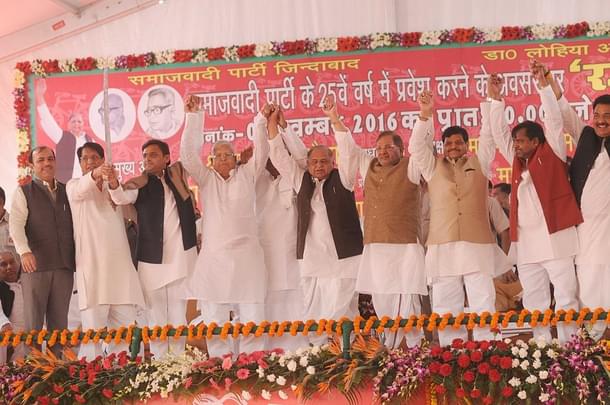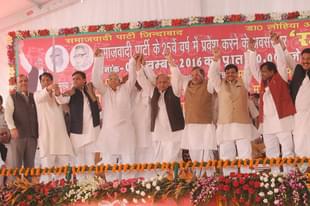Magazine
How The Election Commission Can Pull India Out Of Caste-Based Elections
Major General Mrinal Suman
Sep 05, 2017, 07:33 PM | Updated 07:33 PM IST
Save & read from anywhere!
Bookmark stories for easy access on any device or the Swarajya app.


Undoubtedly, politicians are the fountainhead of all fissiparous tendencies. They flourish by keeping the electorate embroiled in internal dissensions based on region, religion, caste and language considerations. Election time is parochialism time in India. An overriding importance is assigned to caste, creed, communal and regional factors. Most obnoxiously, caste politics is played out unabashedly under the disingenuous taxonomy of “social engineering”.
All newspapers publish articles highlighting the caste-wise configuration of every constituency to make their predictions. Here is a reprehensibly appalling news item that appeared in a leading daily during the Bihar elections. It is symptomatic of the rot that afflicts the media: “In Arrah and Vaishali districts, saffron candidates seem to be drawing support from EBCs (Extremely Backward Classes) and Dalits. This can help them build upon the solid backing they are getting from upper caste Vaishyas, Paswans and Musahars.”
The role played by the electronic media is far worse. The focus of every panel discussion is on the caste percentages and likely equations. It is sickening to hear anchors and panellists making divisive statements like “All Yadavs will vote for Party A”; “Muslims will not vote for Party B”; “All Dalits are with Party C”; ”Kurmis will vote for Party D”; “Brahmins will remain loyal to Party E”; “Mahadalits are with Party F”; “Banias continue to support Party G”; and so on. Pray who will vote as an Indian?
Opinion polls and surveys are also conducted on similar lines. The questions are loaded with parochialism — “Will the Muslim vote get divided?” or “Are Mahadalits angry with Party X?” or “Are Yadavs still with Party Y?” Thereafter, the findings are collated caste-wise, translated into vote shares and analysed at length, thereby inciting partisan emotions.
Reprehensible indeed.
For most TV channels, hosting of a panel discussion during prime time is the most cost-effective option. They call a few aggressive spokespersons and initiate a free-for-all slanging match by throwing in an emotive issue. What can arouse passions more viciously than caste/ religion/ language? Every party plays the caste card shamelessly and yet has the temerity to paint others as communal.
In a mature democracy, the basis of electoral surveys should be economic progress, national security, developmental matters, employment opportunities, educational facilities, health services and such other concerns. Sadly, all issues that impact the well-being of the nation are ignored; only caste and communal loyalties matter.
If after 70 years of Independence, we are sinking deeper into the morass of parochialism, elections are the root cause of the malady. Media acts as a catalyst to spread the virus. Consequently, the whole environment gets so vitiated that caste equations rule supreme with five highly devastating effects on the body politic and unity of the country.
One, instead of making voters rise above narrow parochial mindsets, they are repeatedly reminded of their caste and exhorted to stay faithful to it.
Two, the electorate is brainwashed not to seek accountability from their caste leaders.
Three, assured of continuous support of their caste-based vote banks, most politicians have converted their parties into family enterprises.
Four, the stranglehold of caste politics is so all-pervading that even parties that want to break free are forced to look for winning candidates as per the caste mathematics of each constituency.
Finally and most unfortunately, merit, competence and honesty of the candidates have ceased to be of any consideration. Only the caste matters. So the country is saddled with leaders of questionable character and quality.
The Current Dispensation
The Election Commission of India is tasked under Article 324 of the Constitution to ensure free and fair elections. It has been vested with the responsibility for the “superintendence, direction and control of elections”. The Commission has done India proud by introducing many radical reforms, discharging its duties impartially. Since 1971, a Model Code of Conduct is issued for all elections. The code has been immensely successful in exerting moral pressure on all participants.
Whereas the Representation of the People Act, 1950, deals with the preparation and revision of electoral rolls, the Representation of the People Act, 1951, deals with all aspects of conduct of elections and post-election disputes. Various corrupt practices for which a candidate can invite disqualification have been enumerated in Section 123 of the 1951 Act.
According to Section 123(3), “appeal by a candidate or his agent or by any other person with the consent of a candidate or his election agent to vote or refrain from voting for any person on the ground of his religion, race, caste, community or language” is deemed to be a corrupt practice. Additionally, “the promotion of, or attempt to promote, feelings of enmity or hatred between different classes of the citizens of India on grounds of religion, race, caste, community, or language”, has been made a corrupt practice by Section 123(3A).
Although the above provisions appear to be highly potent, they suffer from three major lacunae that impair their effectiveness considerably. First, they become applicable only when the election process is on, thereby allowing devious candidates to spew venom to consolidate their parochial constituencies prior to the imposition of the model code. Secondly, no preventive or punitive action can be taken by the Commission during the currency of the election process. Deviant candidates can be questioned only through election petitions after the declaration of results and by then the damage would have already been done. Thirdly and most surprisingly, there is no provision to challenge the corrupt practices of the candidates who lose the elections. They go scot free.
However, under Chapter III (Electoral Offences), Section 125 categorically states that “any person who in connection with an election under this Act promotes or attempts to promote on grounds of religion, race, caste, community or language, feelings of enmity or hatred, between different classes of the citizens of India shall be punishable, with imprisonment for a term which may extend to three years, or with fine, or with both.” It is indeed a dissuasive provision but the legal process is far too long-drawn to be effective.
As regards the conduct of the political parties, Section 29A of the 1951 Act empowers the Commission to register associations and bodies as political parties. However, there is no constitutional or statutory provision that gives power to the Commission to de-register political parties on the grounds of violation of any provisions of the Constitution or any undertaking given to the Commission. Thus many unscrupulous political parties get away with their parochial agendas.
Election Commission Cannot Evade Responsibility
Both the Representation of the People Act 1950 and 1951 under Section 28 and 169 respectively empower the Central Government to make rules after consultations with the Election Commission. However, the Central Government is not bound to accept such views or recommendations of the Commission. On many occasions, rules framed or amended have not been in line with the recommendations of the Commission.
The above constraint notwithstanding, the Supreme Court of India has given far-reaching powers to the Election Commission by ruling that where the enacted laws are silent or make insufficient provision to deal with a given situation in the conduct of elections, the Commission has the residuary powers under the Constitution to act in an appropriate manner. From the above, it is amply clear that the Commission has enough powers to rid Indian elections of divisive vote bank politics.
Presently, the Model Code confines itself to four aspects only: (a) prohibiting announcement of new projects or programme or concessions or financial grants in any form or promises thereof which have the effect of influencing the voters in favour of the party in power; (b) total ban on the transfer of all officials connected with the conduct of the election; (c) ban on the misuse of official machinery for elections; and (d) do-s and don’t-s for the guidance of candidates and political parties.
As can be seen, there are no guidelines for the print and electronic media. They are at liberty to spread the virus of hatred based on religion/ race/ caste/ community/ language amongst the voting public. Paid news is shamelessly camouflaged as genuine surveys to sway the voters in favour of unprincipled candidates and parties, thereby vitiating the whole environment.
Therefore, the Commission should enlarge the scope of the Model Code by including the following do-s and don’t-s for the media after the issuance of notification for elections:
a) There should be a total ban on public surveys and opinion polls based on religion/ caste composition of the electorate of an area.
b) No article should be allowed to appear in the print media spelling out proportions of different castes in a constituency and predicting their voting preferences.
c) No TV channel should be allowed to dissect “social engineering” of every constituency to forecast results. In other words, there should be a blanket ban on public discussion of caste-based politics.
Under Para 16 A of the Election Symbol (Reservation and Allotment) Order, 1968, the Commission has assumed the power to take away the symbol of a political party in the event of violation of Model Code, thereby making the party almost dysfunctional. The Commission must exercise this power more resolutely.
The Way Forward
The current brand of vote bank politics precludes letting the countrymen stay united and vote without prejudice. Unfortunately, Indian politicians cannot be expected to change as they believe in the ends and not the means employed. If India has to survive and prosper as a cohesive nation, the elections must be made issue and performance-based, totally free of the caste card. For that, the erring politicians must be made to understand that any misdemeanour will result in their debarment from standing in elections, thereby sealing their political careers.
In December 2016, a comprehensive paper was prepared by the Election Commission on proposed electoral reforms. The paper has been put in the public domain to keep the people informed. The government must respond to the suggestions of the Commission at the earliest.
To start with, powers to make rules should be transferred to the Commission, albeit in consultation with the Central Government. The Commission should also be empowered to suspend/ cancel the registration of a political party for misusing religion/ caste for electoral gains. Similarly, candidates who repeatedly invoke parochial sentiments to gather votes should be debarred from election.
No political party should be registered unless it allows citizens irrespective of any distinctions of caste, community or the like. It should swear allegiance to the provisions of the Constitution and to the sovereignty and integrity of the nation. It should also submit a declaration not to resort to casteism and communalism for political mobilisation, but to adhere to the principles of secularism in the achievement of their objectives.
The Election Commission is the only agency that has the potential and the power to pull India out of the quagmire of caste-based elections. It is a challenge that it must undertake with due urgency. It cannot waver, as delay will prove perilous for the unity of the country. For that, it is essential that the Central Government extends full support to the Commission.
The author commanded his regiment in the Kargil-Siachen sector and was the Task Force Commander at Pokharan for sinking shafts for the nuclear tests. He is a prolific writer and is considered to be the foremost expert on myriad aspects of India’s defence industry, procurement regime and offsets.




